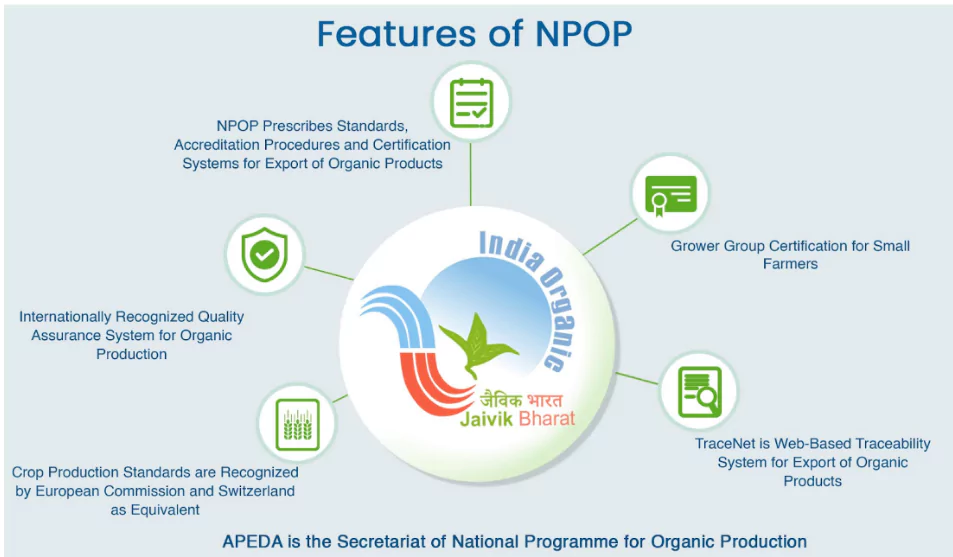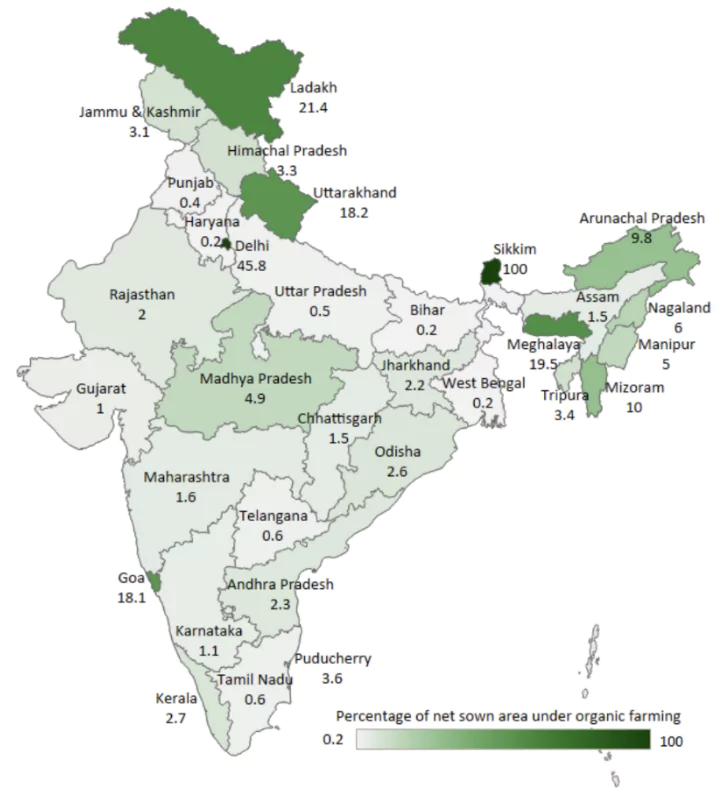Union Minister of Commerce & Industry at an event has recently launched the 8th edition of the National Programme for Organic Production and other portals.
About the National Programme for Organic Production
- The National Programme for Organic Production provides an institutional mechanism for implementation of the,
- National Standards for Organic Production (NSOP), certification system, criteria and procedure for accreditation of Certification Bodies, norms for the operation of certification bodies, the National (India Organic) Logo and the regulations governing its use.
- Secretariat: The Agricultural and Processed Food Products Export Development Authority (APEDA) is the secretariat for the implementation of the NPOP
- Nodal Ministry: Ministry of Commerce & Industries
- Launch: The Program was launched in 2001 to cater to the export requirements of a third-party certification system for organic products
- Legal Act: The Scheme prescribes the regulatory requirements for trade in organic products notified under the provisions of the Foreign Trade Development Regulations Act, 1992 (FTDR).
- Recognitions: The NPOP standards for production and accreditation system have been recognized by the European Commission and Switzerland for unprocessed plant products as equivalent to their country standards.
Enroll now for UPSC Online Classes
- Features:
- Accreditation: To assess and accredit certification programmes of Certification Bodies seeking accreditation under this programme.
- To provide the procedure for evaluation of the certification programme of Certification Bodies under this programme.
- To develop National Standards for Organic Production, processing, handling, and labelling for different product categories.
- To facilitate certification of organic products in conformity with the importing countries’ organic standards as per mutual recognition agreement.
 Ensure that the certification system is transparent, easy to follow and is in line with international best practices.
Ensure that the certification system is transparent, easy to follow and is in line with international best practices.
- Features of The 8th Edition:
- Simplifying Compliance: Certification requirements for Organic Grower Groups have been simplified and granted legal status in place of the Internal Control System (ICS).
- Market Linkages: The Internal Control System (ICS) of the Organic Grower Groups must ensure the procurement of the entire organic produce or establish market linkages to support farmers.
- Reduced Land Conversion Period: The revised derogation provisions allow for a potential reduction of up to three years in the land conversion period to organic, subject to conditions and safeguards.
- Transparency: There is a need now for disclosure of information about organic farmers and other relevant details in the public domain, bolstering system credibility.
- Oversight Mechanisms: Strengthening of oversight mechanisms with the integration of IT tools and the web-based traceability system, Tracenet, for monitoring, surveillance, and data analytics.
About The Portals Unveiled During the Event
- NPOP Portal: It will be a dedicated portal for the National Programme for Organic Production (NPOP) and will provide more visibility and ease of operations for Organic stakeholders.
- Organic Promotion Portal: It will include online Training and capacity building sessions for operators on Organic production and also information on Organic Trade events.
- Farmers, FPOs and exporters can showcase their certified organic products, generate Trade Leads and connect with global buyers.
- TraceNet 2.0: TraceNet empowers stakeholders to streamline operations and meet global organic certification standards by ensuring transparency, traceability, and compliance for organic agricultural and processed food products from farm to market.
- The upgraded online organic traceability system while integrating technology with agriculture will provide for seamless operations and enhanced tools for regulatory oversight.
- Redesigned and Revamped AgriXchange Portal: It enables more user-friendly data analysis and generation of reports & data of Agricultural exports making it accessible for the general public.
- Exporters can seamlessly connect with international buyers and sellers as well as explore comprehensive trade insights at their fingertips.
- APEDA portal: Redesigned and revamped APEDA portal with enhanced user experience and information for the benefit of Agri and Processed food products’ stakeholders.
- National Cooperative Organics Ltd: It has been instituted to specially help in value addition to organic products by working with farmers including training for value addition, packaging & marketing.
About Organic Farming
- Definition: It is a system of production which prohibits the use of synthetically produced agro-inputs like fertilizers and pesticides and uses organic materials (such as crop residues, animal residues, legumes, bio-pesticides) for maintaining soil productivity, fertility and managing pests.
- Holistic Approach: Organic Farming emphasises a whole-system approach including individual components (soil minerals, organic matter, micro-organisms, insects, plants, animals, and humans) to create a sustainable and self-regulating ecosystem.
 Statistics:
Statistics:
- A 2024 survey conducted in 187 countries practising organic agriculture by the international resource data from the Research Institute of Organic Agriculture (FiBL) and International Federation of Organic Agriculture Movements (IFOAM),
- India’s rank 2nd in terms of World’s Organic Agricultural land
- Producers: The Economic Survey 2022-2023 mentions that India has 4.43 Mn organic farmers, the highest in the world.
- Production: India produced around 2.9 Million MT (2022-23) of certified organic products with Fiber crops being the single largest category
- It is followed by Oil Seeds, Sugar crops, Cereals and Millets, Medicinal/ Herbal and Aromatic plants, Spices & Condiments, Fresh Fruit Vegetable, Pulses, Tea & Coffee.
- State wise: Madhya Pradesh emerged as the largest producer followed by Maharashtra, Rajasthan, Karnataka, and Odisha.
- Sikkim formally declared a 100 percent organic state in 2016.
Check Out UPSC NCERT Textbooks From PW Store
- Government Schemes to Promote Organic Farming:
- Paramparagat Krishi Vikas Yojana (PKVY): The scheme launched in 2015 promotes organic farming through the adoption of the organic village by cluster approach with a minimum of 20 Ha size.
- The Large Area Certification (LAC) programme has been initiated since 2020-21 to identify Traditional Organic Areas like hills, islands, tribal or desert belts with no history of GMO and agrochemical use to transform them into certified organic production hubs.
- Mission Organic Value Chain Development for North East Region (MOVCDNER): It is a sub-mission under the National Mission on Sustainable Agriculture which aims to develop crop commodity-specific organic value chain and address gaps in organic crop production, wild crop harvesting, organic livestock management and processing, etc.
- Jaivik Kheti organic e-commerce portal: It directly links farmers with retail as well as bulk buyers, and various stakeholders (regional councils, local groups, individual farmers, buyers, government agencies and input suppliers) for the all-inclusive development and promotion of organic farming
- Support to Organic and Bio-Inputs: Schemes like Bhartiya Prakritik Kheti Bio-Input Resource Centres, PM Programme for Restoration, Awareness, Nourishment and Amelioration of Mother Earth (PM-PRANAAM), Galvanizing Organic Bio-Agro Resources Dhan (GOBARdhan) scheme, etc are encouraging farmers to use organic fertilisers.
![]() 11 Jan 2025
11 Jan 2025

 Ensure that the certification system is transparent, easy to follow and is in line with international best practices.
Ensure that the certification system is transparent, easy to follow and is in line with international best practices. Statistics:
Statistics: